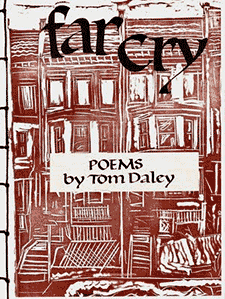 *
*
Review by Off the Shelf Correspondent Dennis Daly
Mischief meets elegiac mournfulness in Tom Daley’s new chapbook, Far Cry, in which the poet summons up the ghost of a close but estranged gay friend and searches through evocative imagery and shared memories for an understanding, a resolution, and, most of all, a final embrace. Unexpected religious and erotic juxtapositions deliver both edgy wit and good-natured humor. And, most impressively, throughout this poetic sequence, Daley utilizes impeccable word choices that result in very high-level, almost objectified, confessional pieces. In short, Daley’s diction sparkles.
Obituary Picture, the first poem in Daley’s collection, begins the festivities by invoking and connecting a conclave of words signifying church officialdom (cardinal, bishop, pope) to the processes at hand: forgiveness and healing. The deceased friend’s pictured attire strikes the poet as especially vivid and implies flamboyant powers, perhaps even those of absolution. Consider these opening and pertinent lines,

Far CryPoems
by Tom Daley
Handmade book
by Sara Lefsyk
www.ethelzine.com
46 Pages
Your dear and dangerous mouth is open
to the sunlight. In your red jersey
and perfectly white t-shirt,
you are a cardinal on holiday.
No mistake that you boasted
that the bishop who baptized you
later elected a pope. Your teeth
are touching, they might be grinding
forgiveness or trust into a fine
powder. You are the chosen
vessel…
My favorite poem in this collection is Infant of Prague. Very funny, very blasphemous, and not a little bizarre, the poem strikes home to those of us steeped in the minutiae of Roman Catholic tradition. Not only did many churches have altars devoted to this ornate iteration of the crowned Christ Child back in the day, but many families had their own Infant for home-based devotions. The statue was introduced into Ireland during the 1700s and became very popular. Daley uses the decorativeness and formalness of the imagined statue to incite mock horror between two friends returning from a night’s drunk, and with it a closeness of shared hilarity, now lost in lament. Here’s the heart of the poem,
Oh my God! It’s an Infant of Prague!
Only you could have conjured
that crowned Christ Child with the orb
that the Altar Guild outfitted
in different gowns for each
liturgical season—purple for Lent,
white for Easter—on a side altar
of a Roman Catholic church,
out of a sack someone had left
on a staircase in the dim light. Only you
could knuckle my funnybone so,
you hand curling up,
fingers digging into my wrist
as if hanging on for dear life
Daley’s title poem, Far Cry, suggests both the literal (long distance) and idiomatic (big difference) definitions of the phrase. We are talking life and death here, or are we?
Passion needs release. Impulse cannot be contained by deliberation. The ritual of written poetry may span distance, but it is very different from sensual memory. Its ululations rebound and echo but are, at least directly, unconnected. One may find positive advantage here. Daley describes the experience thusly,
a truncated hiccup fused
with the urgent, inhaled coo
of a woman trying to suppress
the commotion of her passion
so as to not disturb her neighbors.
The cry repeated itself
With the heft of ritual syllable,
Accelerating, amplifying …
In his poem Death Is the Only, Daley outs himself as a co-conspirator with death. His poetry not only conjures up a spirit marked with utmost urgency but disturbs the neatness and permanence of death with mnemonic traces of messy, unruly life. Words alone must, need to fail. But the poet’s unholy alliance with the beyond seems to succeed, then decidedly leads to a marvelous metaphor of resolution,
… I have conspired
with death to keep
your oblivion at bay.
What is it you would wish me
To do with death?
I can hardly avoid cranking
death open to permit
the ferocity of your predicaments
to tattle me upright.
I am now, in your mind’s eye,
An excuse for death
To leave some dribs of you behind
Over the drab drayhorse of time.
Like all serious poets, Daley struggles with the ineffable. His poem I Address the Virtual Impossibility of Conjuring You with Verses that Are Merely Descriptive illuminates the conundrum he faces. Mixing the profane with the pious Daley undercuts his title, winking to his readers between his “merely descriptive” lines. This poet excels in teasing out past grievances and ironies. The poem concludes this way,
… To the north,
a khaki top or an immaculately
white t-shirt that you had probably ironed.
There were always men in the woodwork,
splintering or shying under the wide
rabbit trap of your eyes. Always
a feast being prepared
in the scorching pockets
of your salivary glands.
Always a haunch
waiting to be palmed,
a genuflection waiting
to be blessed.
Daley titles one of his last pieces in this collection, Am I Any Closer? And in truth he is that and more. By his skill and consummate craft, the poet has confronted the roguish admonishments, irascibility, and unwanted verdicts from his fractured relationship with his deceased friend and has factored in the sweet and moonlit jubilance of imperfect life, all within time’s poetically amendable imagery. By his very act of creation, Daley, with each reading, bridges the unbridgeable. A tour de force.















Reader Comments